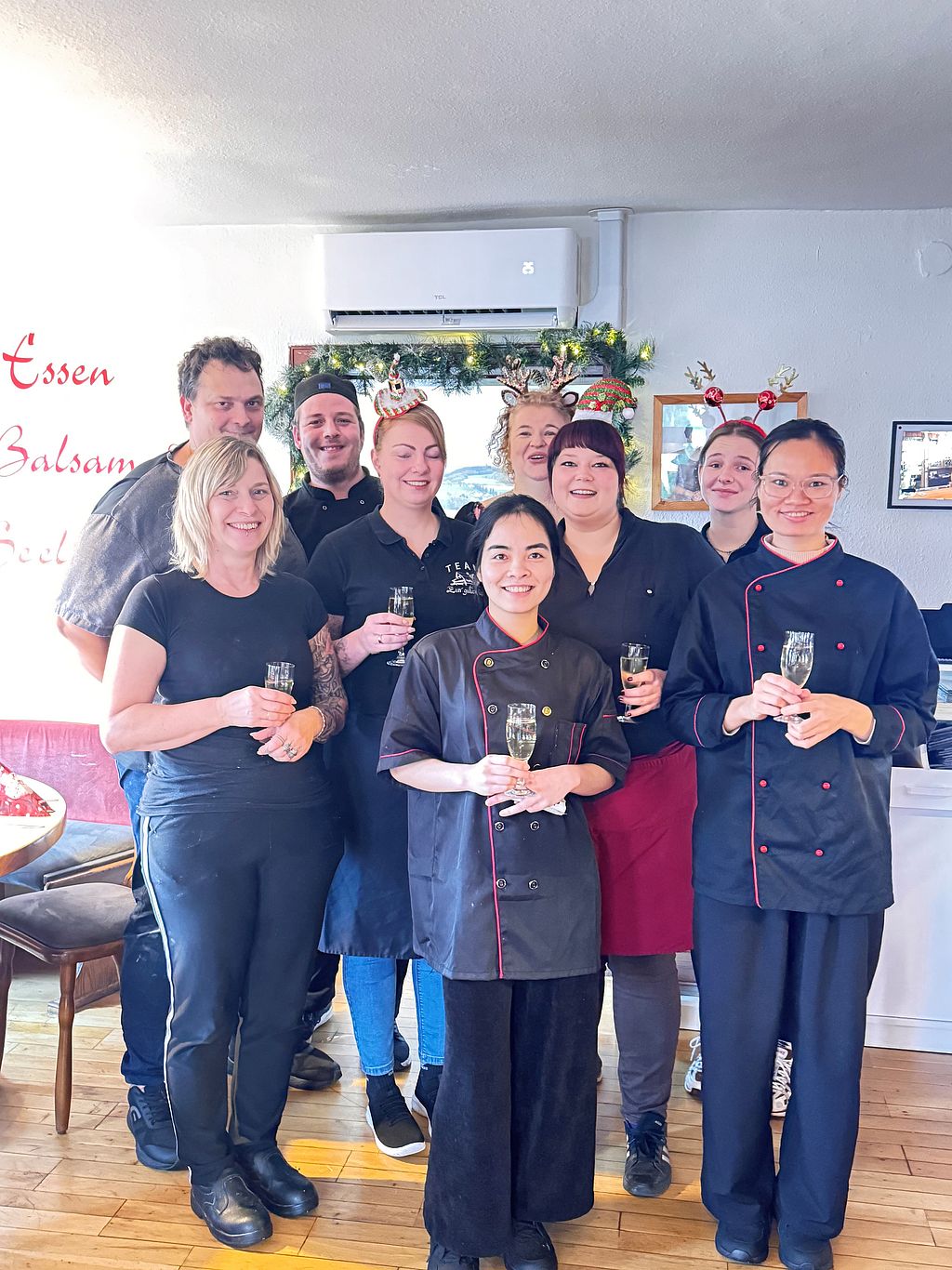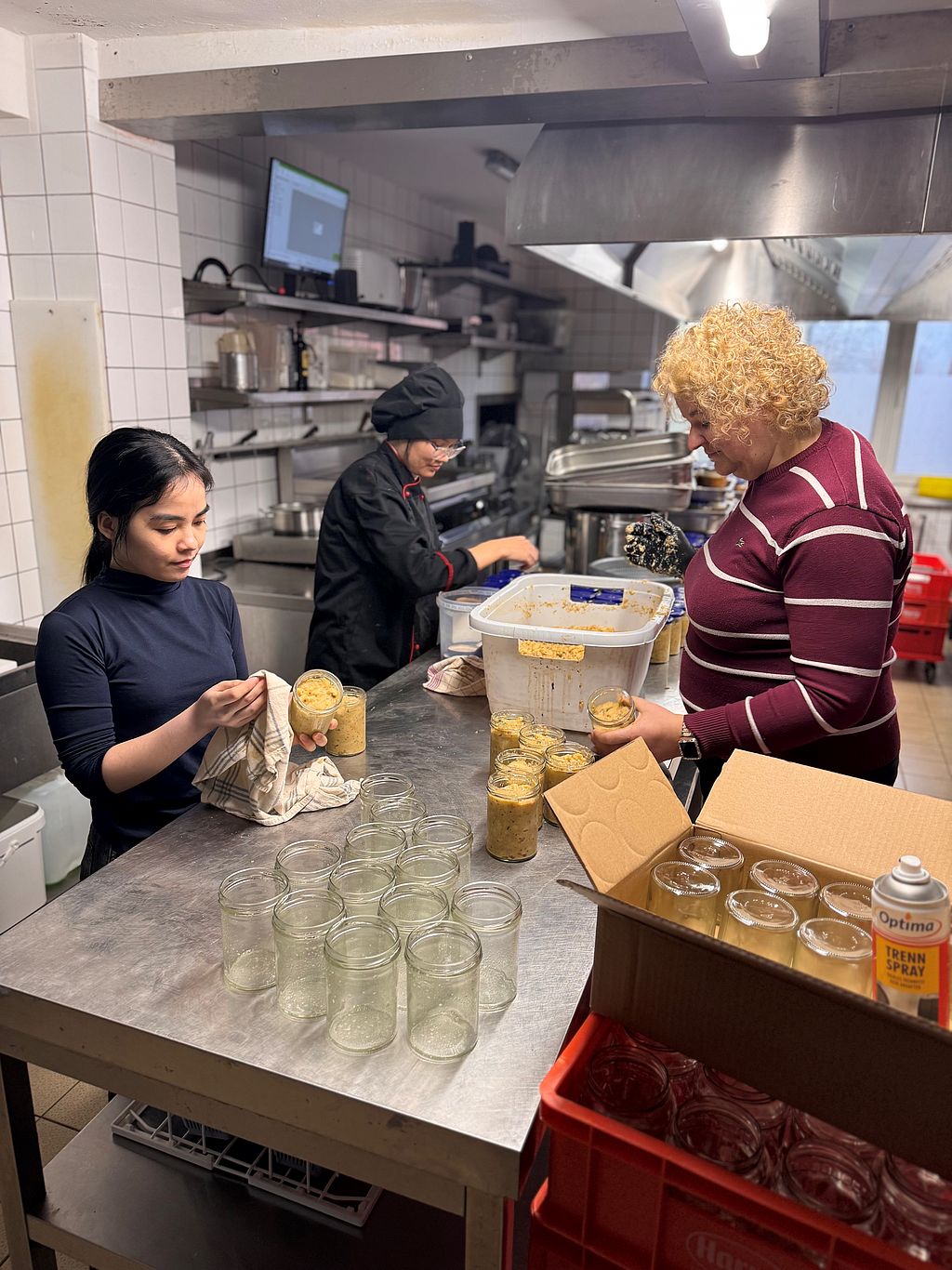Recruiting Skilled Workers via the Recognition Partnership – A Practical Example

Correct as of March 12, 2025
Markus Harrer is the owner of the rustic country restaurant “Zur guten Quelle” in the village of Meimers in the Thuringian Forest. The inn attracts guests with traditional dishes like roulades, as well as high-quality ready-to-eat meals in jars. These offerings on the menu are new for Thi Thía Lê: the Vietnamese chef has only been supporting the family business for a few months. In this short time period, she has already learnt a lot about the Thuringian cuisine – but the inn can also gain a lot by her presence, as Mr Harrer reports.
But how did Ms Lê from the Vietnamese region of Hà Nam come to the small town in the center of Germany? In Vietnam, she trained other chefs in a school herself. She found her way to Germany through her German teacher, who also worked as an interpreter. Through the interpreter job, she had connections to the southwest region of Thuringia, where the inn is located. That is how Ms Lê learnt about the “ViTa” project.
Vietnamese talents for Thuringia – ViTa
The funded cooperative project „Vietnamese Talents for Thuringia – ViTa “ established in 2023 is a cross-sector offer for recruiting skilled workers for the Thuringian economy.
What is the goal?
The project’s goal is to establish structures for the successful immigration of skilled workers and apprentices between Thuringia and Vietnam. By establishing these important connections between these two regions, skilled workers and those interested in vocational training are to be supported in finding new prospects.
Who conducts the project?
The project is conducted by the Chamber of Crafts Suth Thuringia, the Chamber of Crafts Erfurt and the Bildungswerk BAU Hessen-Thüringen e.V., among other institutions and players. In Vietnam, a partner network consisting of language schools and vocational schools, among other institutions, has been established. They conduct a preliminary selection of applicants who wish to work or complete vocational training in Thuringia according to the needs of Thuringian companies.
Who can participate?
Companies all over Thuringia with a need for skilled workers in the professions of the Chamber of Industry and Commerce (IHK) and the Chamber of Crafts (HWK).
With what visa or through which entry path are the skilled workers immigrating?
Various ways and visas are possible. The path that is taken varies from case to case and is assessed in cooperation with the project partners.
In Thuringia, personal recommendations and success stories of other companies play a central role for the project. That is also the case for the inn “Zur guten Quelle”: Owner Markus Harrer got to know about the opportunity through a friend who is an businessman. With the help of the “ViTa” project, the businessman had recruited support from Vietnam for his supermarket branch before. After having received advice over the telephone from Mr Zhao Chen, who is an integration coordinator in the project at the Chamber of Crafts South Thuringia, chef Thi Thía Lê was presented to Mr Harrer. She seemed to be a good fit due to her two-year vocational training in “professional cooking techniques”. After a remote job interview, a decision was made quickly: it’s a match! Ms Lê was invited to support “Zur guten Quelle” – just in time for the Christmas season, if feasible.
Recognition procedure and the fast-track procedure for skilled workers
After detailed consultation, Mr Chen from the Chamber of Crafts South Thuringia and Mr Harrer made their decision: they want to take the path of the relatively new recognition partnership and take advantage of the fast-track procedure for skilled workers in this framework. The Chamber of Industry and Commerce (IHK) verified whether the company was fit to train apprentices, which must be confirmed for the recognition partnership. Then, Mr Chen contacted the local foreigners authority to initiate the fast-track procedure for skilled workers [1] and the employer paid the fee of €411.
Now, some bureaucratic steps were required:
- The skilled worker Ms Lê and the employer Mr Harrer concluded a work contract, including a supplementary agreement on the joint implementation of the recognition partnership.
- The Statement on a Foreign Vocational Qualification (DAB) was obtained at the Central Office for Foreign Education (ZAB) to prove that the professional qualification of Ms Lê as a chef is recognized by the Vietnamese state.
- The Federal Employment Agency gave their consent to the employment. To be able to do this, the Agency assessed Ms Lê’s salary in comparison to the standard regional renumeration for a chef. A characteristic of the recognition partnership is the immediate employment as a skilled worker – even if the professional recognition is still to ab acquired.
- The foreigners authority gave the preliminary approval for the visa. Ms Lê presented that document to the German embassy in Hanoi, booked an appointment and received her visa in the end, initially for one year.
Arriving in Germany
Right before Christmas, the time had come: Ms Lê arrived in Thuringia and was warmly welcomed in the family business. She lives together with three other Vietnamese project participants in a shared flat in Schweina (a part of the neighbouring village Bad Liebenstein). The owner of the inn had organised some furniture for her, pickes her up for work every day by car and occasionally goes grocery shopping with her. For the long term, the two of them are considering whether Ms Lê should buy a motor scooter – they are very popular in Vietnam and in rural Schweina, busses rarely come by. To do that, she would need to have her Vietnamese driving licence converted.
Especially during the initial phase in Germany, a lot of bureaucratic steps had to be taken and Ms Lê had to got to know her surroundings. During this phase, it is important that employers are there for their new skilled workers, which may be time-consuming. But the better the initial phase works out, the faster sustainable integration into the company will take place.

In-company integration
So, how does working together in the company work out? Markus Harrer is satisfied by his new chef and happy that she was able to help out during the holiday season. Ms Lê’s does high-quality, accurate work and her skill set is no way inferior to chefs who were trained in Germany.
Of course, in the beginning, there was a considerable language barrier. Between her German language course and the time she left Vietnam, there was a period during which she could not practice the language – and that became noticeable during the workdays at the inn. Fortunately, in this case, a Vietnamese-speaking service employee works there as well, helping with smaller translations.
After less than two months, significant progress was already made in communicating in German. Ms Lê currently takes online German classes provided by the academy of cooperative education, and she also uses apps to improve her linguistic knowledge in the field of cooking. This can be a solution for regions like rural Thuringia, in which there are few services for learning German in person.
And what about the menu? Rolling roulades and breading schnitzels is something the chef did not know about in Vietnam. Therefore, a small crash course on the Thuringian cuisine was due. Conversely, the inn could also benefit from the Vietnamese chef, according to Mr Harrer. He can even imagine combining the culinary differences in German-Vietnamese fusion cuisine and serve spring rolls with regional side dishes, for example. The owner is already satisfied at a level, at which he would choose the same recruitment path again.
What’s next in the recognition procedure?
After the chef had arrived, the application for professional recognition was submitted to IHK FOSA. The results will reveal whether further knowledge and skills must be acquired, so that the Vietnamese professional qualification is fully recognized in Germany. In this case, it opens up the option of having the residence permit for the recognition partnership extended for two additional years to fully complete the recognition procedure. The chef is allowed to work during this time and any differences identified in comparison to the German vocational training can be compensated for. The inn would be obliged to release Ms Lê for the period necessary to take part in compensatory measures.
Info box
If the skilled worker does not acquire full recognition of the foreign professional qualification, the option of employment in the framework of the special regulation for professionally experienced workers can be considered in case of a non-regulated profession.
Mr Chen from the from the Chamber of Crafts South Thuringia accompanies Ms Lê and the company closely and supports any pending bureaucratic steps. The example shows that, with commitment and the right partners, recruiting skilled workers from abroad can also be done successfully by small family-owned businesses.
“Make it in Germany” would like to thank Ms Thi Thía Lê, Mr Markus Harrer and Mr Zhao Chen for sharing their experiences!
Further information
The federal government’s portal offers comprehensive information and support for companies wishing to recruit international skilled workers. Projects like “ViTa” and counselling centres in the region help in understanding the procedure and overcoming bureaucratic challenges.
- Are you a company in Thuringia? Then the Thuringian Agency For Skilled Personnel Marketing (ThAFF) is your central point of contact.
- Do you own a company outside Thuringia and are interested in endeavours similar to “ViTa”? Here you can find more projects supporting employers with recruiting skilled workers abroad. If there are no suitable options for you, please contact your local counselling centres – such as the Chambers of Industry and Commerce (IHK) and Trades and Crafts (HWK), welcome centres, business development programmes, the IQ Network or the Employer Service – to find out what offers are available to you.
- Please use our database (currently only available in German) to find a suitable counselling centre in your area.
- The Quick-Check for employers offers you an overview of your options for recruiting skilled workers and apprentices from abroad.
- On the portal, you will also find the individual steps for recruiting from abroad, as well as short brochures and documents on this topic in the “Downloads” section.
References
[1] The employer gave his power of attorney to the integration coordinator. In some federal states, the central foreigners authorities are the competent bodies, however, there is no central body located in Thuringia.
Do you have any questions?
Let us advise you on your opportunities to work and live in Germany. Our experts will support you with questions regarding job search, visa, recognition and learning German.
You can find out more about the various contact options by clicking on one of the icons in the bar below.
